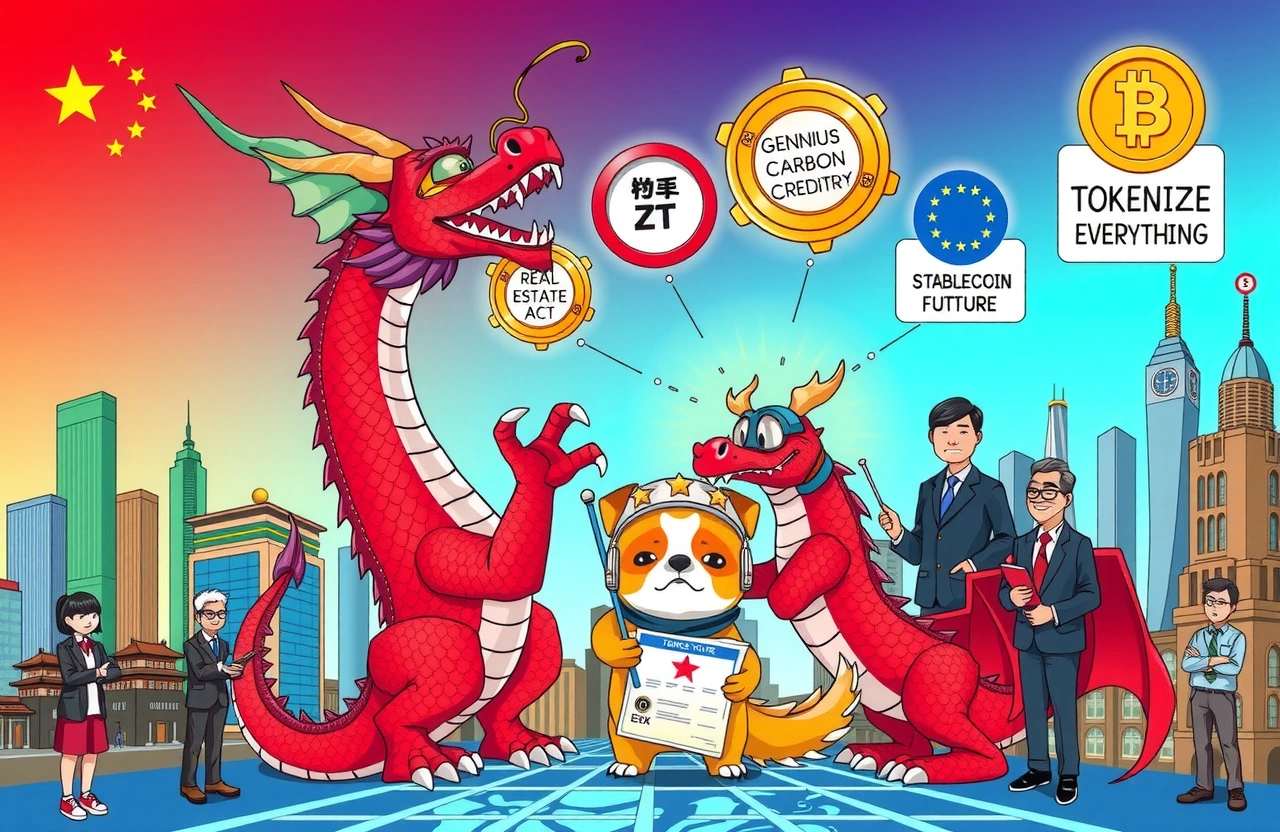Understanding the RWA Revolution
What began as blockchain experimentation now stands ready to transform global finance. Real World Asset tokenization (RWA) converts physical assets—from real estate to corporate stocks—into blockchain-based tokens. This technological leap enables fractional ownership, 24/7 trading, and borderless access to previously illiquid assets. The market potential is staggering: Boston Consulting Group projects RWA will grow into a $16.1 trillion industry by 2030, representing 10% of global GDP.
The GENIUS Act: America’s Regulatory Gambit
On July 18, 2025, President Trump signed the Guidance for Establishing National Innovation of United States Stablecoins Act (GENIUS Act), establishing America’s framework for dollar-pegged cryptocurrencies. Treasury Secretary Janet Yellen declared this protects dollar hegemony: “Cryptocurrencies won’t threaten dollar dominance—they’ll reinforce it.” The legislation positions US regulators to oversee what could become a $3.7 trillion stablecoin market by 2030. Trump framed it as economic warfare: “Losing reserve currency status equals losing a world war.”
Hong Kong’s Countermove
Just 11 days post-GENIUS, Hong Kong enacted its pioneering Stablecoin Ordinance effective August 1. The full framework includes:
- Mandatory 1:1 reserve backing for licensed stablecoins
- Third-party monthly auditing requirements
- Capitalization thresholds for issuers
Over 40 Hong Kong financial institutions upgraded licenses for crypto trading and asset tokenization by July 2025. GF Securities even issued “GF Token”—China’s first interest-bearing tokenized security—showcasing accelerating institutional adoption.
Robinhood Ignites the Stock Tokenization Boom
On June 30, Robinhood detonated market excitement by launching stock tokenization for European investors. Their platform enables:
- Fractional trading of 200+ US stocks/ETFs
- Tokens representing private firms like SpaceX and OpenAI
- $1 minimum investments replacing traditional share minimums
Investors voted with capital—Robinhood shares surged 41.5% in June followed by another 17.2% July jump. CEO Vlad Tenev championed the model: “We’re democratizing access to the world’s most valuable private companies.”
The Infrastructure Powering Tokenization
Behind Robinhood’s platform lie breakthrough technologies:
- Permissioned blockchains recording ownership
- Smart contracts automating dividends/corporate actions
- Hybrid custody blending traditional brokers with crypto wallets
Tokenization magic happens through converting assets into digital certificates traded peer-to-peer via primary issuance protocols.
Critical Challenges Emerge
Despite the excitement, stock tokenization faces substantive hurdles:
Perils of Fragmented Liquidity
On July 3, Robinhood’s Apple token AAPLX traded at 12% premium to NASDAQ prices while its Amazon token hit a 400% premium. The liquidity gap creates ideal conditions for whale manipulation. One trader observed: “You essentially get casino conditions without table limits.”
The Regulatory Vacuum
Lithuania’s central bank launched Robinhood inquiries saying tokens “blur lines between real equities and derivatives.” Core concerns include:
- No mechanisms preventing insider trading
- Ambiguous legal standing during corporate actions
- Cross-border regulatory arbitrage risks
OpenAI publicly disavowed Robinhood’s tokens: “We don’t endorse this—these aren’t actual company shares.” Elon Musk bluntly tweeted: “Your equity claims are fake.”
The $16 Trillion Future
Visionaries see RWA transforming finance fundamentals:
Real Estate Revolution
Platforms like RealT already tokenize US rental properties—$50 buys fractional ownership yielding rental income. Dubai plans to move $160 billion worth of real estate onto blockchain in 2025.
Institutional On-Ramps
JPMorgan introduced JPM Coin for institutional settlements while BlackRock launched BUIDL—a tokenized money fund holding US Treasuries. These validate blockchain’s institutional infrastructure potential.
Tokenizing Everything
Gold tokenization pioneer PAXG already backs each token with physical LBMA gold bars. Companies are testing tokenization for:
- Intellectual property royalties
- Carbon credits
- Fine art ownership
The dream extends to tokenizing Trump Tower—converting billion-dollar properties into $1 blockchain tokens accessible globally.
The Geographical Race
Financial centers recognize RWA’s strategic value:
- US seeks to control cryptocurrency through regulation
- Hong Kong angles for market share via progressive rules
- Europe develops tokenization frameworks simultaneously
The victor won’t necessarily have the fastest tech—instead, whoever builds the most trusted legal and liquidity infrastructure will dominate. China maintains cautious public positioning while institutions like Guotai Junan Securities quietly develop tokenization capabilities through Hong Kong subsidiaries.
From Manhattan’s skyline to Victoria Harbour’s lights, this decentralized competition defines our financial future. Tokenization creates breakthrough ownership models—but requires thoughtful governance to avoid becoming Wall Street’s digital Wild West.
- The RWA evolution merges blockchain efficiency with tangible value
- Stock tokenization enables fractional ownership of exclusive assets
- Buying “Tesla tokens” differs from actual Tesla shares—understand what rights tokens convey
- Monitor regulatory developments—watch FINMA and HKMA rulings particularly
- Participate cautiously: this revolution will transform finance whether we’re ready or not




